-
 Bitcoin
Bitcoin $82,099.5826
-1.34% -
 Ethereum
Ethereum $1,817.9545
-1.07% -
 Tether USDt
Tether USDt $0.9999
0.02% -
 XRP
XRP $2.0815
-3.96% -
 BNB
BNB $595.8647
-1.53% -
 Solana
Solana $124.0327
-0.92% -
 USDC
USDC $1.0000
0.01% -
 Dogecoin
Dogecoin $0.1634
-3.94% -
 Cardano
Cardano $0.6445
-4.65% -
 TRON
TRON $0.2336
1.34% -
 Toncoin
Toncoin $3.9381
2.61% -
 Chainlink
Chainlink $13.2201
-3.75% -
 UNUS SED LEO
UNUS SED LEO $9.0947
-5.84% -
 Stellar
Stellar $0.2646
-1.90% -
 Avalanche
Avalanche $18.6234
-3.91% -
 Shiba Inu
Shiba Inu $0.0...01214
-3.88% -
 Sui
Sui $2.2126
-6.78% -
 Hedera
Hedera $0.1604
-6.61% -
 Polkadot
Polkadot $4.0237
-1.97% -
 Litecoin
Litecoin $82.1655
-4.48% -
 MANTRA
MANTRA $6.2849
-1.13% -
 Bitcoin Cash
Bitcoin Cash $298.8203
-2.66% -
 Dai
Dai $1.0000
0.02% -
 Bitget Token
Bitget Token $4.4293
-4.57% -
 Ethena USDe
Ethena USDe $1.0000
0.01% -
 Pi
Pi $0.6976
-9.77% -
 Hyperliquid
Hyperliquid $12.5853
-0.74% -
 Monero
Monero $215.4717
-0.22% -
 Uniswap
Uniswap $5.8825
-1.85% -
 Aptos
Aptos $5.1958
-2.29%
How to manage multiple accounts in Binance Wallet?
Binance Wallet requires separate logins for each account, demanding strong, unique passwords managed via a password manager. Meticulous organization and awareness of separate tax implications for each account are crucial for secure crypto management.
Mar 24, 2025 at 06:42 pm
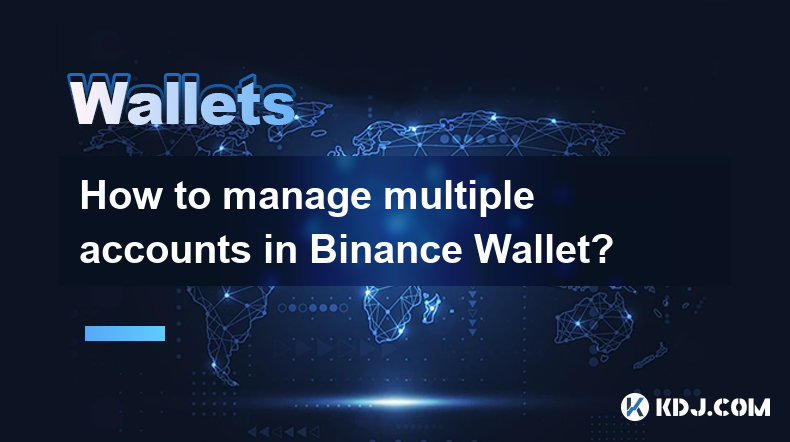
Key Points:
- Binance Wallet doesn't directly support managing multiple accounts within a single interface. Each account requires a separate login.
- Security best practices strongly advise against using the same password across multiple accounts.
- Using a password manager is crucial for secure management of multiple Binance accounts.
- Careful organization through naming conventions and dedicated folders is essential for tracking your various accounts.
- Understanding the implications of holding assets across multiple accounts for tax purposes is vital.
How to Manage Multiple Accounts in Binance Wallet?
Binance Wallet, unlike some other platforms, doesn't offer a unified dashboard to manage multiple accounts simultaneously. Each Binance account operates independently, requiring a unique login and password for access. This separate account structure is a security feature designed to isolate funds and prevent unauthorized access if one account is compromised.
Managing multiple Binance accounts effectively hinges on robust organizational strategies and secure password management practices. Avoid the common mistake of reusing passwords across different accounts. A compromised password on one account could jeopardize all others.
To mitigate this risk, utilizing a reputable password manager is strongly recommended. These tools generate strong, unique passwords for each account and securely store them, eliminating the need to remember complex combinations. Popular password managers include LastPass, 1Password, and Bitwarden. Choose a manager that meets your security preferences and device compatibility needs.
Beyond password management, establishing a clear organizational system for your various accounts is vital. Consider using a consistent naming convention for each account, perhaps reflecting the purpose or type of assets held within. For example, "Binance-Trading," "Binance-Staking," "Binance-LongTerm." This will improve your ability to quickly identify the appropriate account when needed.
Furthermore, consider creating dedicated folders on your computer or device to store relevant information for each account. This could include screenshots of transaction histories, security keys (if applicable), and any other crucial documentation. This structured approach minimizes confusion and ensures easy access to essential information.
Remember that each Binance account is a separate entity in terms of tax reporting. If you are trading or holding cryptocurrencies across multiple accounts, it's crucial to meticulously track all transactions for accurate tax preparation at the end of the tax year. Consult with a qualified tax professional to ensure compliance with all applicable regulations in your jurisdiction. Failing to properly account for your transactions across all accounts can lead to significant penalties.
The security of your crypto assets is paramount. Therefore, practicing good operational security is crucial. This includes enabling two-factor authentication (2FA) on all your Binance accounts. 2FA adds an extra layer of security, requiring a second verification step beyond your password, typically through a code generated by an authenticator app on your phone.
Another vital aspect is regularly reviewing your account activity. Check your transaction history, balances, and security settings periodically to detect any suspicious activity. Promptly report any unauthorized access or unusual transactions to Binance support. Your vigilance plays a crucial role in maintaining the security of your funds.
While Binance doesn't offer a built-in solution for managing multiple accounts within a single interface, the strategies outlined above provide a framework for secure and efficient management. The key is combining robust password management with meticulous organization and regular security checks. Remember, your proactive approach is the most effective defense against potential security threats and tax complications.
Frequently Asked Questions:
Q: Can I link multiple Binance accounts together?
A: No, Binance accounts are independent entities and cannot be directly linked. Each requires a separate login.
Q: Is it safe to use the same password for multiple Binance accounts?
A: Absolutely not. Using the same password across accounts significantly increases your risk of losing all your assets if one account is compromised.
Q: What happens if I forget the password to one of my Binance accounts?
A: Binance offers password recovery options, usually involving email or mobile verification. However, the process can be time-consuming. A password manager can help avoid this scenario.
Q: How does having multiple Binance accounts affect my tax obligations?
A: Each account's activity is separately reportable for tax purposes. You must track transactions across all accounts accurately to comply with tax laws. Seek professional tax advice.
Q: Are there any third-party tools to manage multiple Binance accounts?
A: There aren't any officially supported third-party tools to manage multiple Binance accounts in a single interface. However, password managers and spreadsheet software can aid in organization.
Q: Can I transfer assets between my multiple Binance accounts?
A: Yes, you can transfer assets between your different Binance accounts. However, be mindful of any associated fees and ensure you are transferring to the correct account. Double-check the receiving address before initiating the transfer.
Q: What security measures should I prioritize when managing multiple Binance accounts?
A: Prioritize strong, unique passwords for each account, enable 2FA, use a password manager, and regularly review your account activity for suspicious transactions. Report any suspicious activity immediately to Binance.
Disclaimer:info@kdj.com
The information provided is not trading advice. kdj.com does not assume any responsibility for any investments made based on the information provided in this article. Cryptocurrencies are highly volatile and it is highly recommended that you invest with caution after thorough research!
If you believe that the content used on this website infringes your copyright, please contact us immediately (info@kdj.com) and we will delete it promptly.
- CZ Announces Plan to Donate 500 BNB Each to Myanmar and Thailand
- 2025-03-31 20:00:12
- Bitcoin (BTC -2.46%) has earned a place in almost every investor's portfolio.
- 2025-03-31 20:00:12
- Bitcoin (BTC) ETF Witnessed a Major Shift as Investors Pulled out $93 Million
- 2025-03-31 19:55:12
- Nigeria Accuses Binance of Facilitating Terrorism and Kidnapping Financing
- 2025-03-31 19:55:12
- A Sentiment Shift Appears Underway Within the XRP Community
- 2025-03-31 19:50:12
- A Quarter of S&P 500 Firms Could Be Holding Bitcoin on Their Balance Sheets by 2030: Report
- 2025-03-31 19:50:12
Related knowledge

How to easily generate a Bitcoin payment address
Mar 29,2025 at 10:49am
Generating a Bitcoin payment address might seem daunting, but it's actually quite straightforward. This process is crucial for receiving Bitcoin, as each transaction requires a unique address. Understanding how this works is fundamental to using Bitcoin effectively. This guide will walk you through the simple steps, regardless of your technical experti...
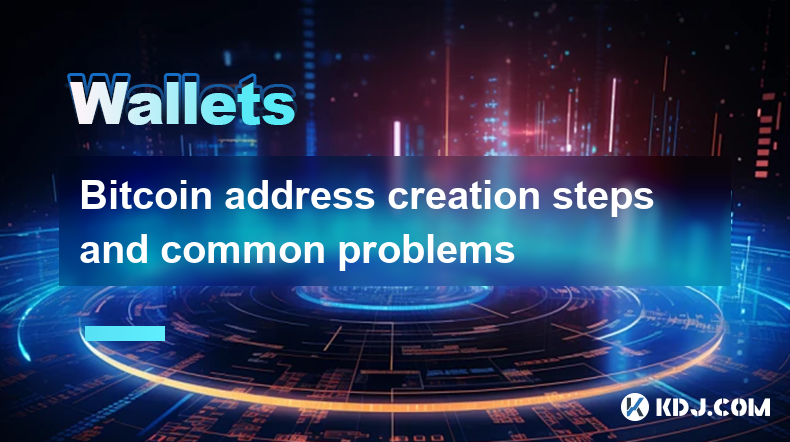
Bitcoin address creation steps and common problems
Mar 30,2025 at 06:07am
Understanding Bitcoin AddressesA Bitcoin address is a unique identifier, similar to a bank account number, used to receive Bitcoin. It's a string of alphanumeric characters generated from a public key, derived from your private key. Understanding the distinction between public and private keys is crucial for Bitcoin security. Your private key should be...
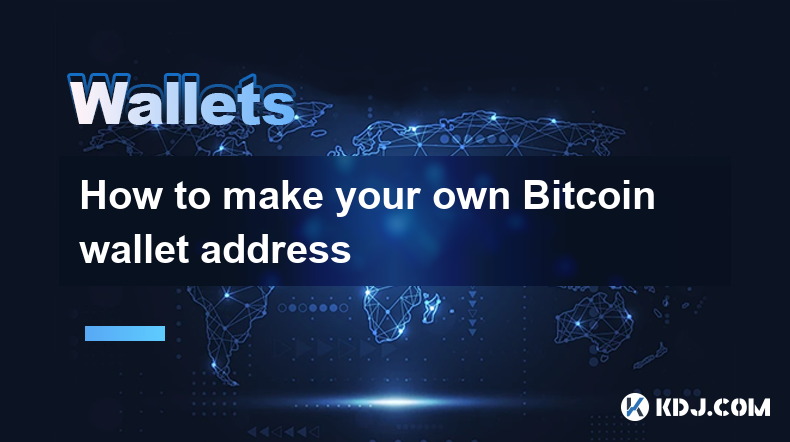
How to make your own Bitcoin wallet address
Mar 29,2025 at 08:42pm
Creating your own Bitcoin wallet address is crucial for securing and managing your Bitcoin holdings. It allows you to independently receive and send Bitcoin without relying on third-party services. This process involves understanding the different types of wallets and choosing the one that best suits your needs and technical expertise. Incorrectly gene...
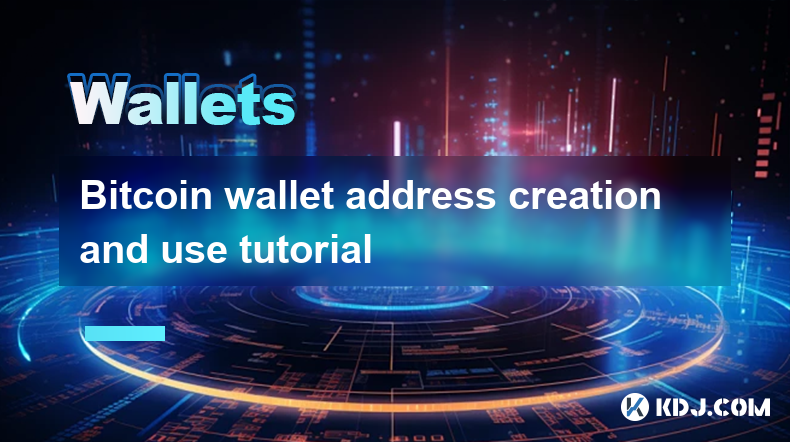
Bitcoin wallet address creation and use tutorial
Mar 29,2025 at 10:14pm
Understanding Bitcoin Wallet AddressesA Bitcoin wallet doesn't store Bitcoin in the way a traditional bank account does. Instead, it stores private keys, which are cryptographic secrets allowing you to access and spend your Bitcoin. Your Bitcoin address, on the other hand, is a public identifier, like an email address, that others can use to send you B...

Bitcoin address generation and secure storage guide
Mar 30,2025 at 08:07am
Understanding Bitcoin AddressesA Bitcoin address is essentially your public key, a string of alphanumeric characters used to receive Bitcoin. It's analogous to your bank account number. Unlike your private key, which is crucial for spending your Bitcoin, your address can be shared publicly without compromising your funds. Generating a new address is sim...
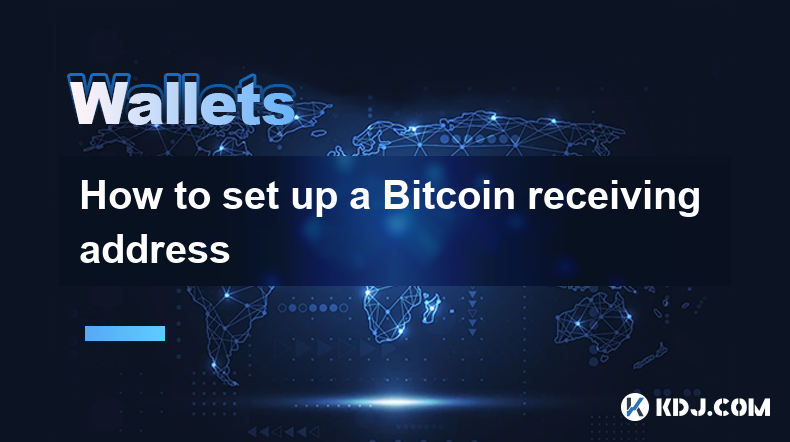
How to set up a Bitcoin receiving address
Mar 30,2025 at 06:14pm
Understanding Bitcoin Receiving AddressesA Bitcoin receiving address is essentially your unique identifier on the Bitcoin network. It's a string of alphanumeric characters that allows others to send Bitcoin to you. Think of it like your bank account number, but specifically for Bitcoin. You need a receiving address to receive Bitcoin. Crucially, you ca...

How to easily generate a Bitcoin payment address
Mar 29,2025 at 10:49am
Generating a Bitcoin payment address might seem daunting, but it's actually quite straightforward. This process is crucial for receiving Bitcoin, as each transaction requires a unique address. Understanding how this works is fundamental to using Bitcoin effectively. This guide will walk you through the simple steps, regardless of your technical experti...

Bitcoin address creation steps and common problems
Mar 30,2025 at 06:07am
Understanding Bitcoin AddressesA Bitcoin address is a unique identifier, similar to a bank account number, used to receive Bitcoin. It's a string of alphanumeric characters generated from a public key, derived from your private key. Understanding the distinction between public and private keys is crucial for Bitcoin security. Your private key should be...

How to make your own Bitcoin wallet address
Mar 29,2025 at 08:42pm
Creating your own Bitcoin wallet address is crucial for securing and managing your Bitcoin holdings. It allows you to independently receive and send Bitcoin without relying on third-party services. This process involves understanding the different types of wallets and choosing the one that best suits your needs and technical expertise. Incorrectly gene...

Bitcoin wallet address creation and use tutorial
Mar 29,2025 at 10:14pm
Understanding Bitcoin Wallet AddressesA Bitcoin wallet doesn't store Bitcoin in the way a traditional bank account does. Instead, it stores private keys, which are cryptographic secrets allowing you to access and spend your Bitcoin. Your Bitcoin address, on the other hand, is a public identifier, like an email address, that others can use to send you B...

Bitcoin address generation and secure storage guide
Mar 30,2025 at 08:07am
Understanding Bitcoin AddressesA Bitcoin address is essentially your public key, a string of alphanumeric characters used to receive Bitcoin. It's analogous to your bank account number. Unlike your private key, which is crucial for spending your Bitcoin, your address can be shared publicly without compromising your funds. Generating a new address is sim...

How to set up a Bitcoin receiving address
Mar 30,2025 at 06:14pm
Understanding Bitcoin Receiving AddressesA Bitcoin receiving address is essentially your unique identifier on the Bitcoin network. It's a string of alphanumeric characters that allows others to send Bitcoin to you. Think of it like your bank account number, but specifically for Bitcoin. You need a receiving address to receive Bitcoin. Crucially, you ca...
See all articles






















































































